Fermented Coffee or Cultured Coffee is a new buzzword in the specialty coffee industry and for a good reason. Unlike the conventional cup of joe, fermented coffee has an extremely fruity and tangy flavor profile that is praised by many coffee lovers!
Key Takeaways
- Fermented coffee often has a sweet mouthfeel and bright, acidic taste that is quite different from regular coffee.
- All coffee beans go through some natural fermentation, but specialty fermented coffees take it further with intentional, controlled fermenting.
- At home, you can make a fermented coffee kombucha by brewing cold brew coffee then adding a SCOBY and letting it culture.
- Though not as probiotic-rich as other fermented foods, fermented coffee is easier to digest and has fewer bitter tannins.
As an Amazon Associate, I earn commission from qualifying purchases.
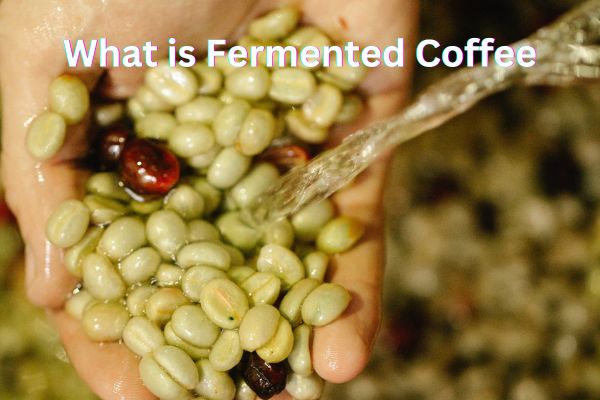
In this guide, I will explain what coffee fermentation is, what makes these funky coffees so unique, and most importantly how you can prepare fermented coffee at home.
What is fermented coffee?
Fermented coffee refers to a unique method in coffee processing that involves allowing the green coffee beans to undergo a natural fermentation process before the beans are roasted.
This fermenting step brings out some wild flavors you won’t find in your usual morning cup! The sugars in the cherry break down and interact, often highlighting sweet, fruity tastes with a smooth mouthfeel.
It sounds kinda funky letting coffee essentially “rot” a bit during processing. But that controlled natural ferment really unlocks some special qualities. The best way I can describe the taste is bright, acidic, and tangy!
Not all coffee drinkers will love the fruit-forward flavor of a fermented coffee. But if you wanna expand your coffee horizons and get experimental, try Ethiopian or Costa Rican fermented coffee.
What is fermentation?
Fermentation is a process that involves the chemical breakdown of organic substances by enzymes, bacteria, or other microorganisms. It is used to convert sugars and carbohydrates into alcohols, acids, or useful probiotics.
Fermentation is widely used in the production processes for making foods, beverages, fuels, pharmaceuticals, and other products.
Key applications include brewing beer, winemaking, baking bread, producing dairy products like yogurt and cheese, and even creating vinegar.
How is fermented coffee different from regular coffee?
All coffee goes through a bit of fermentation during processing – it’s just usually not the main flavor event in regular coffee.
There are three methods usually incorporated for processing harvested coffee beans; wet, dry, or honey.
Wet Process
In the wet process, coffee cherries are pulped, and the beans undergo fermentation in tanks or water-filled vats for around 12-48 hours. Here, enzymes and microorganisms break down the mucilage layer around the beans.
After that, the clean green coffee beans are dried under the sun.
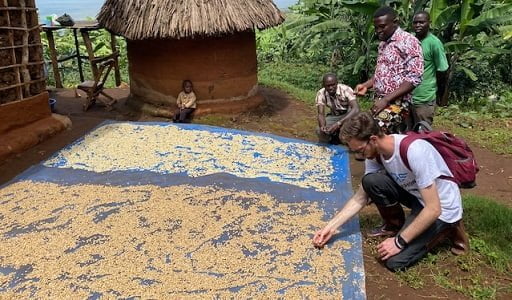
Dry Process
Dry processing involves drying whole coffee cherries in the sun, allowing fermentation within the fruit for up to several weeks. This softens the pulp layer on coffee cherries and makes it easier for mechanical removal.
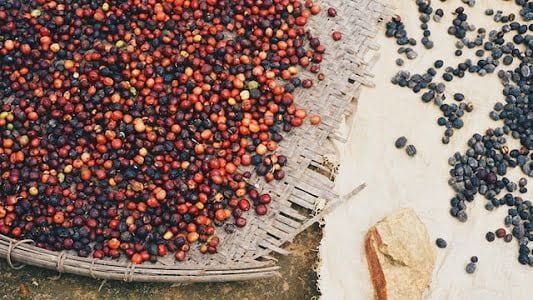
Honey Process
The honey process involves first removing the skin but keeping some mucilage on the beans known as “honey”. This sweet layer fuels a natural fermentation during the 3-4 week drying period and intensifies the coffee’s sweet flavors.
Check out a guide on the wet vs dry process coffee
Anaerobic Fermentation of Coffee beans
In Anaerobic Fermentation, First, they harvest the fresh coffee cherries then remove the outer skin and fruit pulp from the beans.
At this point, there’s a super sweet, sticky layer of mucilage still covering the beans that proceed with the fermentation process similar to honey processing.
Now the magic happens – they transfer the beans into anaerobic fermentation tanks and let the beans ferment for anywhere from 12 hours to 3 days.
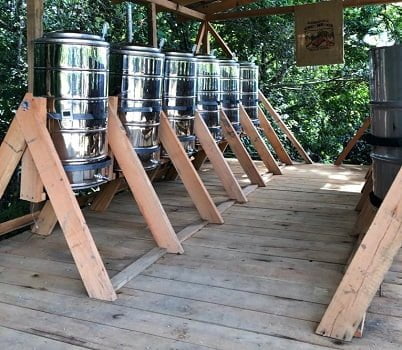
During this time, natural enzymes and microbes in the mucilage break that stuff down, converting sugars into fruity and floral compounds in an oxygen-free environment.
Some allow the coffee beans to culture naturally while some add special bacteria and yeast to develop even more complex flavors.
As fermentation finishes, the beans are washed again to stop the process and remove any residue before drying.
This leaves flavorful fermented beans ready to be roasted and ground for an insanely fruit-forward, complex-tasting brew!
Barrel aged coffee
Barrel-aged coffee is java that undergoes fermentation in emptied alcohol barrels, soaking up flavors from spirits like whiskey, rum, or bourbon.
Each type of alcohol barrel infuses distinct notes into the beans—whiskey delivers smoky tones, rum adds sweetness, and bourbon offers rich caramel hints.
There are only a handful of companies that offer barrel-aged coffee beans, and some popular ones are Morning Dram, Cooper’s Cask, and Whiskey Morning.
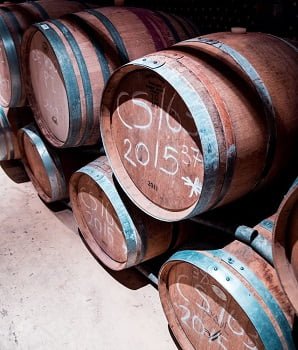
Fruit fermented coffee
Fruit-fermented coffee is the latest crazy flavor innovation where they actually let harvested coffee cherries ferment fully submerged in fruit juice instead of water.
Most commonly the coffee beans are soaked in Orange or Pineapple juice to induce sweet, vibrant, and tangy notes.
What does fermented coffee taste like?
Fermented coffee has a distinct taste profile characterized by complex, often fruity, and sometimes wine-like flavors.
Every single sip is bright and complex, kinda reminiscent of high-quality fruit juice. Except this fruit juice packs a caffeine punch!
Now full disclosure – if you’re into traditional dark roasted coffee taste, fermented coffee may be too unorthodox for you. You may not like it, and I am also not a big fan of fermented coffee as it masks the intense and full-bodied nature of coffee.
I personally tried the Colombia Wine Yeast Coffee Beans from Volcanica which was quite unique. There were cocoa undertones plus intense fruity, pineapple, and sugarcane notes in each sip. A very distinct fermented coffee experience.
How to Ferment Coffee at Home? The Kombucha Coffee
So far I have discussed how green coffee beans are fermented but do you know you can also ferment coffee at home?
Here’s the detailed DIY Recipe of fermented brewed coffee aka Coffee Kombucha or Koffucha using the cold brew method.
Ingredients:
- Coffee Beans
- Unflavored kombucha
- Sugar
- Mason jar
- Sugar
Instructions:
1- Brew a strong cold brew coffee concentrate using a 1:5 coffee-to-water ratio. That means you should add around 200 grams of coffee grounds to a liter of water. This will make a very strong coffee concentrate that you can dilute to taste afterward.
I like to use fruity Ethiopian or Colombian beans for Coffee Kombucha.
2- Add 4 tablespoons of sugar and stir it gently to dissolve all the sugars. Adding sugar is necessary for the fermentation even if you don’t like sweetened coffee.
3- Let the mixture steep for 12-24 hours at room temperature. After brewing, strain the coffee concentrate using a filter to remove the grounds. Collect the liquid in a separate clean jar.
4- Add the SCOBY (which can be obtained from a previous kombucha batch or purchased) and half a cup of starter tea liquid (previously brewed kombucha or acidic liquid) into the jar.
5- Seal the jar tightly and allow it to ferment at room temperature (60-70 degrees) for 5-10 days.
6- Start tasting the fermented coffee daily after the 5 days and remove the scoby once the desired tart and carbonation are achieved.
7- Pour the fermented coffee kombucha into clean glass bottles or jars and place it in the refrigerator. This helps slow down the fermentation process.
8- Serve the chilled coffee kombucha over ice, with optional sweeteners or flavors to taste.

Also Read: How to Make Cold Brew in French Press
Health Benefits of Fermented Coffee
Now I know what you’re thinking – fermented foods like yogurt pack healthy probiotics, so funky fermented coffee must be super good for your gut right? Well turns out not so much.
During fermentation, the sugars in the coffee cherries are broken down by microorganisms, but the high temperatures in roasting and brewing eliminate the probiotics.
However, fermented coffee has some distinct benefits.
1- Easy to Digest: The fermentation process does make the beans easier to digest by breaking down some of the fibrous compounds. So there is less chance of any stomach irritation or indigestion issues with fermented coffee.
2- Less Tannins: Tannins are bitter, astringent compounds locked into the raw beans that can cause stomach problems and discoloration of teeth. Fermenting coffee can lower its tannin levels.
Lastly, fermented coffee often maintains its freshness longer, preserving its aromatic qualities due to the impact of fermentation on the chemistry of the beans.
Also Read: Amazing Health Benefits of Espresso
Kopi Luwak – Coffee Fermented by Animal
Kopi Luwak is a specialty Indonesian coffee that gets “processed” through the digestive tract of Asian palm civets!
The Civets eat up the ripest coffee cherries and then poop out the beans to be harvested.
I know it sounds crazy, but the natural fermentation that happens in the civet’s stomach intensifies flavors and smooths out beans in a way no human could replicate.
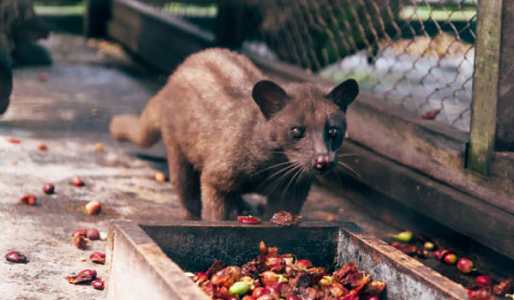
The funky fruity ferment and enzymatic magic in the tummy of Civet bring out the unique sweetness and super-rich flavors.
So while it might seem nasty to drink poop coffee at first, Kopi Luwak ends up shockingly smooth, complex, and clean on the palate.
Kopi Luwak is also one of the most expensive coffees in the World!
Final Thoughts
And there you have it – a complete guide on fermented coffee. From its tangy, fruit-forward flavor to its potential health benefits, this funky java brings something new to the table.
So what do you think – would you be up for trying fermented coffee? Or does it sound too odd? Hit us up in the comments! We’d love to hear if you’re pro-fermentation or just wanna stick with regular roast.
Discover exciting article related to coffee beans
- What is Single Origin Coffee
- What is Third Wave Coffee
- What is a Coffee Blend
- What is Mushroom Coffee
- What is Honey Process Coffee
- Organic vs Non Organic Coffee
- What is Enzyme Coffee
FAQs
Is fermented coffee alcoholic?
No, fermented coffee is not alcoholic. Although it undergoes a fermentation process, the alcohol content remains negligible or non-existent as it’s roasted and brewed.
Drinkers do not need to worry about any intoxicating effects from this unique type of coffee.
Are all coffee beans fermented?
Yes, most coffee beans undergo some level of fermentation during processing. It’s a natural part of the production process that influences the beans’ flavors.
Some Coffee beans are fermented intentionally to a higher degree with an Anaerobic or Barrel-aged process to achieve a specific flavor profile.



